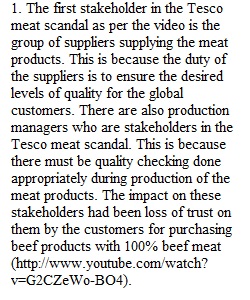


Q Watch the following video, then answer the four questions as an essay with each question as a separate paragraph Link: http://www.youtube.com/watch?v=G2CZeWo-BO4 Summary The reaction to revelations that meat from horses and pigs were contained in products sold by British retailer Tesco as containing 100 percent beef was quick and condemning. British Prime Minister David Cameron forcefully attacked the retailer for selling mislabeled products stating that the company was fully responsible for the products it sells. The scandal emerged after testing by Irish authorities revealed that various products sold by the British grocer contained as much as 29 percent horse meat despite being labeled as 100 percent beef. Testing also revealed that products labeled as beef contained meat from pigs. Tim Smith, the CEO of Tesco, has promised to get to the bottom of the issue. He announced that the company was investigating the supplier to determine exactly what had happened in the production of the products involved. In the meantime, all affected products were being removed from shelves and consumers were being offered a full refund for any affected products they had bought. Tesco contends that its suppliers are either grossly negligent or are simply lying about the products they are selling. One of the suppliers involved, Liffey Meats, claimed that the problem goes further back in the supply chain, accusing an unknown third party European Union supplier of the product mix-up. Another supplier, Silvercrest Meats, made a similar statement. For now, consumers are faced with the fact that they may have violated their moral or religious beliefs by unknowingly eating a product that contained horse or pig meat. 1. Identify the stakeholders involved in this scandal. What is the impact of the situation on each stakeholder? 2. Tesco has blamed its suppliers for the producing products containing horse meat. Do you agree with Tesco? Who is ultimately responsible for the products sold in the store? 3. Consider corporate governance in this situation. Did Tesco do what it should? What else could the retailer have done? Did suppliers like Liffey Meats act in a responsible manner? 4. Tesco CEO Tim Smith claims that its suppliers are either lying or are grossly negligent. Can the same be said of Tesco?
View Related Questions